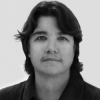Catherine Opie

Catherine Opie
Catherine Opieis an American fine-art photographer. She studies the relationships between mainstream and infrequent society, with a large emphasis on sexual identity, specializing in portraiture, studio, and landscape photography. Through photography Opie documents the connections between the individual and the space inhabited. She lives and works in West Adams, Los Angeles. She is well known for her work of portraits exploring the Los Angeles leather-dyke community. Opie is currently a professor of photography at University of California at Los Angeles...
NationalityAmerican
ProfessionArtist
CountryUnited States of America
I want to seduce my viewers and be able to hold them with the work. Much of that is done in terms of formalist ideas that I bring to the work.
I'm very interested in the language of photography in relationship to painting.
One of the greatest things about being an artist is, as you get older, if you keep working hard in relationship to what you want the world to be and how you want it to become, there is a history of interesting growth that resonates with different moments in your life.
I go back and forth, but I never wanted to be the photographer of the gay and lesbian community. I will wave a rainbow flag proudly, but I am not a singular identity. I think a singular identity isn't very interesting, and I'm a little bit more multifaceted as a person than that.
I'm a complete supporter of Obama and kind of in love with him.
Light is everything in photographs and has to be considered in all situations.
There's a lesbian aesthetic, just as there's gay camp, but I don't know if there's such a thing as 'lesbian art.'
I do photograph things for people to look at 100 years from now. But we're such a mediated society that things become historical the next day.
I'm kind of a twisted social documentary photographer.
Language is a very complicated thing, and that's one of the reasons why I like making photographs.
When we were kids, growing up in the sixties, the only images we had of ourselves were either still photographs or 8mm movies.... Now we have video, digital cameras, MP3s, and a million other ways to document ourselves. But the still photograph continues to hold a sense of mystery and awe to me.
I really love to drive. It's really hard for me to be a passenger, even though I get to look around a little bit more, but I've gotten really good at driving and looking.
I always give a print to everybody I photograph, and some of my subjects have told me they have a hard time hanging them up at home.
...things become mainstream when they become imaged over and over again. Something happens in relationship to ideas of representation that makes it more palatable or digestible.